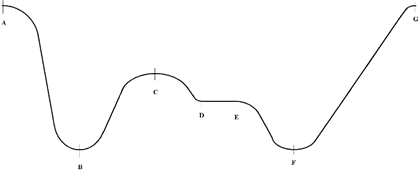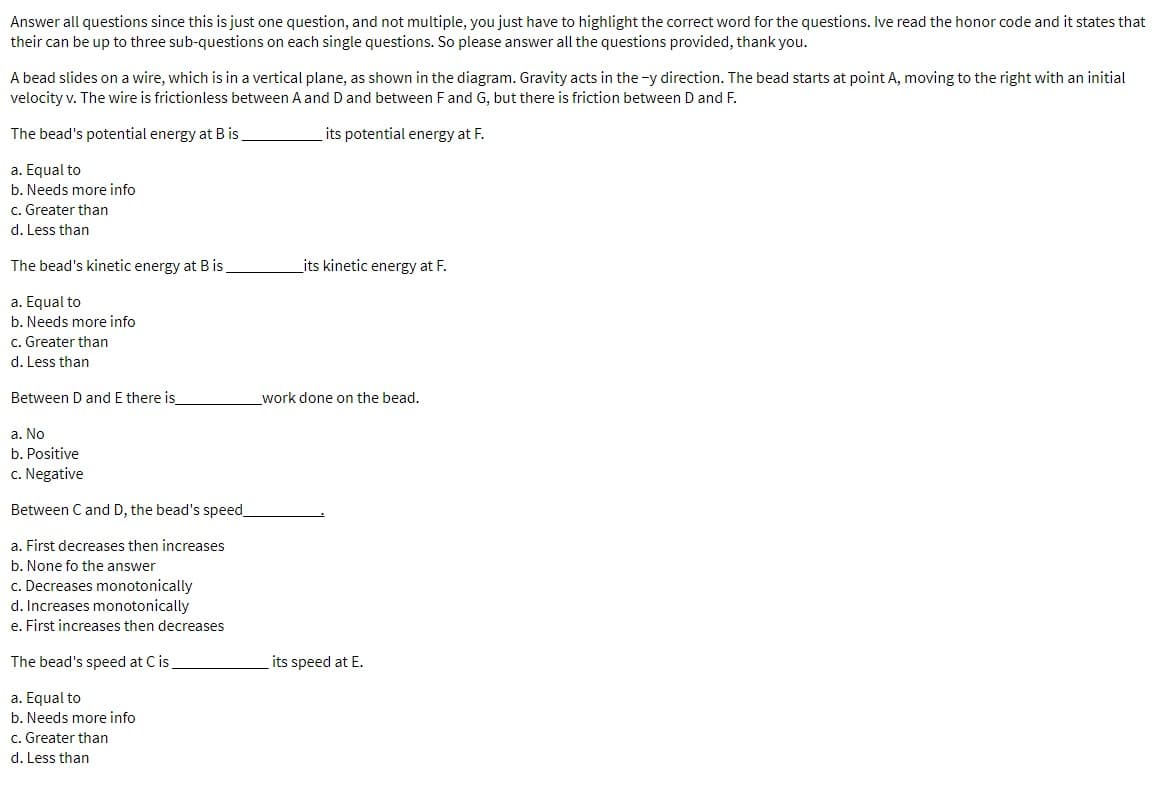Answer all questions since this is just one question, and not multiple, you just have to highlight the correct word for the questions. Ive read the honor code and it states that their can be up to three sub-questions on each single questions. So please answer all the questions provided, thank you. A bead slides on a wire, which is in a vertical plane, as shown in the diagram. Gravity acts in the -y direction. The bead starts at point A, moving to the right with an initial velocity v. The wire is frictionless between A and D and between F and G, but there is friction between D and F. The bead's potential energy at B is its potential energy at F. a. Equal to b. Needs more info c. Greater than d. Less than The bead's kinetic energy at B is. a. Equal to b. Needs more info c. Greater than d. Less than Between D and E there is a. No b. Positive c. Negative Between C and D, the bead's speed_ a. First decreases then increases b. None fo the answer c. Decreases monotonically d. Increases monotonically e. First increases then decreases The bead's speed at C is a. Equal to b. Needs more info c. Greater than d. Less than its kinetic energy at F. work done on the bead. its speed at E.
Answer all questions since this is just one question, and not multiple, you just have to highlight the correct word for the questions. Ive read the honor code and it states that their can be up to three sub-questions on each single questions. So please answer all the questions provided, thank you. A bead slides on a wire, which is in a vertical plane, as shown in the diagram. Gravity acts in the -y direction. The bead starts at point A, moving to the right with an initial velocity v. The wire is frictionless between A and D and between F and G, but there is friction between D and F. The bead's potential energy at B is its potential energy at F. a. Equal to b. Needs more info c. Greater than d. Less than The bead's kinetic energy at B is. a. Equal to b. Needs more info c. Greater than d. Less than Between D and E there is a. No b. Positive c. Negative Between C and D, the bead's speed_ a. First decreases then increases b. None fo the answer c. Decreases monotonically d. Increases monotonically e. First increases then decreases The bead's speed at C is a. Equal to b. Needs more info c. Greater than d. Less than its kinetic energy at F. work done on the bead. its speed at E.
Related questions
Question
Answer all the quesitons as bartleby allows for subquestion, plus this is just one qusetion

Transcribed Image Text:D
E
P

Transcribed Image Text:Answer all questions since this is just one question, and not multiple, you just have to highlight the correct word for the questions. Ive read the honor code and it states that
their can be up to three sub-questions on each single questions. So please answer all the questions provided, thank you.
A bead slides on a wire, which is in a vertical plane, as shown in the diagram. Gravity acts in the -y direction. The bead starts at point A, moving to the right with an initial
velocity v. The wire is frictionless between A and D and between F and G, but there is friction between D and F.
The bead's potential energy at B is
its potential energy at F.
a. Equal to
b. Needs more info
c. Greater than
d. Less than
The bead's kinetic energy at B is.
a. Equal to
b. Needs more info
c. Greater than
d. Less than
Between D and E there is
a. No
b. Positive
c. Negative
Between C and D, the bead's speed_
a. First decreases then increases
b. None fo the answer
c. Decreases monotonically
d. Increases monotonically
e. First increases then decreases
The bead's speed at C is
a. Equal to
b. Needs more info
c. Greater than
d. Less than
its kinetic energy at F.
work done on the bead.
its speed at E.
Expert Solution
This question has been solved!
Explore an expertly crafted, step-by-step solution for a thorough understanding of key concepts.
Step by step
Solved in 2 steps with 1 images
